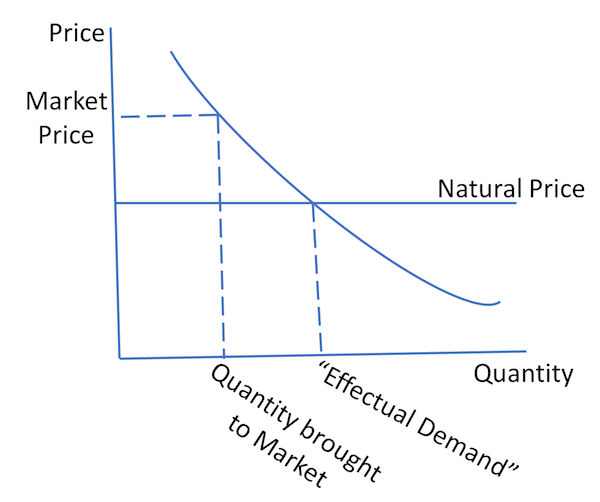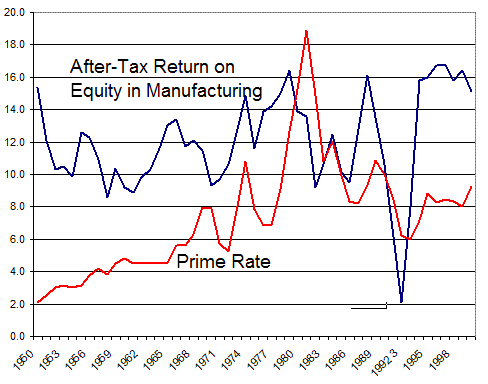|
An Inquiry into the
Nature and Causes by
Adam Smith 1776 Book
1, Chapter 6 OF
THE COMPONENT PARTS OF THE PRICE
OF COMMODITIES
In that early and rude state of
society which precedes both the accumulation of stock and
the appropriation of land, the proportion between the
quantities of labour necessary for acquiring different
objects seems to be the only circumstance which can afford
any rule for exchanging them for one another. If among a
nation of hunters, for example, it usually costs twice the
labour to kill a beaver which it does to kill a deer, one
beaver should naturally exchange for or be worth two deer. [I, vi, 4, p. 65] In this state of things, the
whole produce of labour belongs to the labourer; and the
quantity of labour commonly employed in acquiring or
producing any commodity is the only circumstance which can
regulate the quantity exchange for which it ought commonly
to purchase, command, or exchange for. As soon as stock has accumulated
in the hands of particular persons, some of them will
naturally employ it in setting to work industrious people,
whom they will supply with materials and subsistence, in
order to make a profit... In exchanging the complete
manufacture either for money, for labour, or for other
goods, over and above what may be sufficient to pay the
price of the materials, and the wages of the workmen,
something must be given for the profits of the undertaker of
the work who hazards his stock in this adventure... He could
have no interest to employ them, unless he expected from the
sale of their work something more than what was sufficient
to replace his stock to him; and he could have no interest
to employ a great stock rather than a small one, unless his
profits were to bear some proportion to the extent of his
stock. [I, vi, 8, p. 67] As soon as the land of any
country has all become private property, the landlords, like
all other men, love to reap where they never sowed, and
demand a rent even for its natural produce... This portion,
or, what comes to the same thing, the price of this portion,
constitutes the rent of land, and in the price of the
greater part of commodities makes a third component part. The real value of all the
different component parts of price, it must be observed, is
measured by the
quantity of labour which they can, each of them, purchase or
command. Labour measures the value not only of that part of
price which resolves itself into labour, but of that which
resolves itself into rent, and of that which resolves itself
into profit. Book
1, Chapter 7 OF
THE NATURAL AND MARKET PRICE
OF COMMODITIES
There is likewise in every
society or neighbourhood an ordinary or average rate of
rent, which is regulated too, as I shall show hereafter,
partly by the general circumstances of the society or
neighbourhood in which the land is situated, and partly by
the natural or improved fertility of the land. These ordinary or average rates
may be called the natural rates of wages, profit, and rent,
at the time and place in which they commonly prevail. When the price of any commodity
is neither more nor less than what is sufficient to pay the
rent of the land, the wages of the labour, and the profits
of the stock employed in raising, preparing, and bringing it
to market, according to their natural rates, the commodity
is then sold for what may be called its natural price. [I, vii, 7, p. 73] The market price of every
particular commodity is regulated by the proportion between
the quantity which is actually brought to market, and the
demand of those who are willing to pay the natural price of
the commodity, or the whole value of the rent, labour, and
profit, which must be paid in order to bring it thither.
Such people may be called the effectual demanders, and their
demand the effectual demand; since it may be sufficient to
effectuate the bringing of the commodity to market. It is
different from the absolute demand... When the quantity of any commodity which is brought to market falls short of the effectual demand, all those who are willing to pay the whole value of the rent, wages, and profit, which must be paid in order to bring it thither, cannot be supplied with the quantity which they want. Rather than want it altogether, some of them will be willing to give more. A competition will immediately begin among them, and the market price will rise more or less above the natural price, according as either the greatness of the deficiency, or the wealth and wanton luxury of the competitors, happen to animate more or less the eagerness of the competition. . .  [I, vii, 12, p. 74] If at any time it exceeds the
effectual demand, some of the component parts of its price
must be paid below their natural rate. If it is rent, the
interest of the landlords will immediately prompt them to
withdraw a part of their land; and if it is wages or profit,
the interest of the labourers in the one case, and of their
employers in the other, will prompt them to withdraw a part
of their labour or stock from this employment. The quantity
brought to market will soon be no more than sufficient to
supply the effectual demand. All the different parts of its
price will rise to their natural rate, and the whole price
to its natural price. . . [I, vii, 15, p. 75] [I, vii, 33, p. 80] Book
1, Chapter 8 OF
THE WAGES OF LABOUR
In that original state of
things, which precedes both the appropriation of land and
the accumulation of stock, the whole produce of labour
belongs to the labourer. He has neither landlord nor master
to share with him. [I, viii, 6, p. 83] It seldom happens that the
person who tills the ground has wherewithal to maintain
himself till he reaps the harvest. His maintenance is
generally advanced to him from the stock of a master, the
farmer who employs him, and who would have no interest to
employ him, unless he was to share in the produce of his
labour, or unless his stock was to be replaced to him with a
profit. This profit, makes a second deduction from the
produce of the labour which is employed upon land. [I, viii, 11, p. 83] It is not, however, difficult to foresee which of the two parties must, upon all ordinary occasions, have the advantage in the dispute, and force the other into a compliance with their terms. The masters, being fewer in number, can combine much more easily; and the law, besides, authorizes, or at least does not prohibit their combinations, while it prohibits those of the workmen. We have no acts of parliament against combining to lower the price of work; but many against combining to raise it. In all such disputes the masters can hold out much longer... We rarely hear, it has been said, of the combinations of masters, though frequently of those of workmen. But whoever imagines, upon this account, that masters rarely combine, is as ignorant of the world as of the subject. Masters are always and everywhere in a sort of tacit, but constant and uniform combination, not to raise the wages of labour above their actual rate. To violate this combination is everywhere a most unpopular action, and a sort of reproach to a master among his neighbours and equals... But though in disputes with
their workmen, masters must generally have the advantage,
there is, however, a certain rate below which it seems
impossible to reduce, for any considerable time, the
ordinary wages even of the lowest species of labour. A man must always live by his
work, and his wages must at least be sufficient to maintain
him. They must even upon most occasions be somewhat more;
otherwise it would be impossible for him to bring up a
family, and the race of such workmen could not last beyond
the first generation. . . There are certain circumstances,
however, which sometimes give the labourers an advantage,
and enable them to raise their wages considerably above this
rate; evidently the lowest which is consistent with common
humanity. When in any country the demand
for those who live by wages, labourers, journeymen, servants
of every kind, is continually increasing; when every year
furnishes employment for a greater number than had been
employed the year before, the workmen have no occasion to
combine in order to raise their wages. The scarcity of hands
occasions a competition among masters, who bid against one
another, in order to get workmen, and thus voluntarily break
through the natural combination of masters not to raise
wages. The demand for those who live by
wages, it is evident, cannot increase but in proportion to
the increase of the funds which are destined for the payment
of wages. These funds are of two kinds; first, revenue which
is over and above what is necessary for the maintenance;
and, secondly, the stock which is over and above what is
necessary for the employment of their masters. [I, viii, 22, p. 87] [I, viii, 24, p. 89] [I, viii, 38, p. 97]
Book 1, Chapter 9 [I, ix, 1, p. 105]
By the 37th of Henry VIII
all interest above ten per cent was declared unlawful. More,
it seems, had sometimes been taken before that. In the reign
of Edward VI religious zeal prohibited all interest. This
prohibition, however, like all others of the same kind, is
said to have produced no effect, and probably rather increased
than diminished the evil of usury. The statute of Henry VIII
was revived by the 13th of Elizabeth, c. 8, and ten per cent
continued to be the legal rate of interest till the 21st of
James I, when it was restricted to eight per cent. It was
reduced to six per cent soon after the Restoration, and by the
12th of Queen Anne to five per cent. All these different
statutory regulations seem to have been made with great
propriety. They seem to have followed and not to have gone
before the market rate of interest, or the rate at which
people of good credit usually borrowed. Since the time of
Queen Anne, five per cent seems to have been rather above than
below the market rate. Before the late war, the government
borrowed at three per cent; and people of good credit in the
capital, and in many other parts of the kingdom, at three and
a half, four, and four and a half per cent.
Book 1, Chapter 10 OF WAGES AND PROFIT IN THE DIFFERENT EMPLOYMENTS OF LABOUR AND STOCK
[I, x, Part 3, 22, p. 142] The inhabitants of a town, being collected into one place, can easily combine together... [I, x, Part 3, 23, p. 143] [I, x, Part 3, 27, p. 145]
Book 1, Chapter 11 OF THE RENT OF LAND [I, xi, 1, p. 160]
NOTE: Smith's theory of rent is,
perhaps, the biggest flaw in his overall theory of value.
Earlier, he promised to explain "natural price" by giving us
self-standing theories of wages, profits, and rents, and
then adding them together: Natural Price = Natural Wages
+ Natural Profits + Natural Rents But now, he has broken the promise, and says his theory of rent is: Rent = Price - Wages - Profits If he doesn't give us a
self-standing theory of Rent, then he hasn't given us a full
theory of Prices. So we will see that David Ricardo will
attempt to solve that problem. Book 2, Chapter 3 [II, iii, 16, p. 337] What is
annually saved is as regularly consumed as what is annually
spent, and nearly in the same time too; but it is consumed by
a different set of people. That portion of his revenue which a
rich man annually spends is in most cases consumed by idle
guests and menial servants, who leave nothing behind them in
return for their consumption. That portion which he annually
saves, as for the sake of the profit it is immediately
employed as a capital, is consumed in the same manner, and
nearly in the same time too, but by a different set of people,
by labourers, manufacturers, and artificers, who reproduce
with a profit the value of their annual consumption. His
revenue, we shall suppose, is paid him in money. Had he spent
the whole, the food, clothing, and lodging, which the whole
could have purchased, would have been distributed among the
former set of people. By saving a part of it, as that part is
for the sake of the profit immediately employed as a capital
either by himself or by some other person, the food, clothing,
and lodging, which may be purchased with it, are necessarily
reserved for the latter. The consumption is the same, but the
consumers are different. [II, iii, 27, p. 341] [II, iii, 28, p. 342] [II, iii, 30, p. 342] [II, iii, 31, p. 342] |

